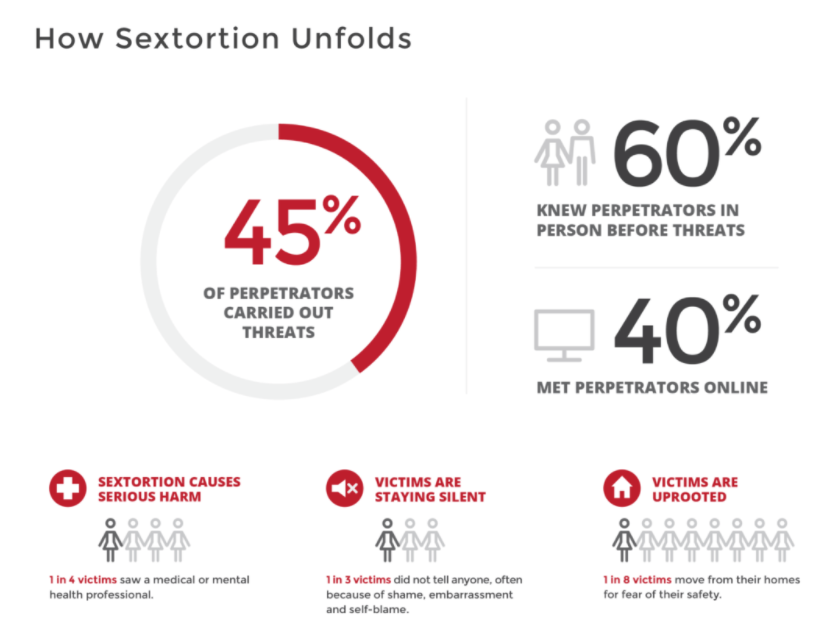What is sextortion?
Sextortion is a term that describes a broad category of sexual exploitation crimes, usually involving abuse of power, coercion, and threats to release sexual images and/or information. While there are many types of sextortion and anyone can become a victim, the Federal Bureau of Investigations (FBI) notes that there has been a significant increase in sextortion cases involving children and teens. A worrying statistic shows that children and teens are being coerced into sending explicit images of themselves to predators online.
Sextortion involving minors, in many cases, begins online. Predators approach children on social media sites, forums, video games, etc., and trick the victims into believing they are talking to someone their own age. Once initial contact has been made, they will try to establish a relationship with the victim.

After some time, they will start using threats, money, flattery, deception, etc., to coerce a minor into sending them explicit images. In some cases, criminals start threatening minors from the very beginning. They may claim from the start that they have the victim’s explicit images and will reveal them online if more pictures are not sent. Once predators have the image(s), they will try to get more by threatening to release the ones in their possession online or by threatening them with violence. Children, already frightened by the situation, often end up sending more explicit images. In many cases, childer are afraid of telling anyone what is happening because they feel ashamed and fear violence from the predator.

The FBI provides helpful tips on how parents and guardians can talk to children and teens about sextortion. The site also has useful information for caregivers to help understand why children often become victims of sextortion, why they are hesitant to tell anyone, and how to help them.
If you or someone you know is being threatened into sending explicit images, you need to report it to your local law enforcement agency. Sextortion is a very serious crime, particularly because it often involves vulnerable children. And because victims often feel fear and shame over becoming a victim of sextortion, it’s very important to provide the appropriate support to a victim and use all available resources to help them deal with what happened.
How to protect a child from becoming a victim of sextortion?
- Have open communication.
One of the most important things a caregiver can do to prevent a child from becoming a sextortion victim is explaining all about these types of crimes. Children should be aware that people online can pretend to be anyone and a stranger approaching them on social media may have bad intentions. While it may be a difficult conversation to have, children may recognize they are about to become a victim of sextortion before it’s too late because of it.
- Explain the dangers of social media.
Because a lot of predators approach their victims on social media, it’s very important that children are aware of what is and what isn’t appropriate online, as well as what should not be shared on social media. Caregivers should clearly explain how information posted on social media by children can give predators the means to approach them, as well as make clear that once posted, nothing really disappears on the Internet. Children should also be encouraged to block and ignore strangers who approach them on social media or other similar platforms.
- Review children’s social media account settings.
Children do not always care about their privacy online because they do not yet realize how dangerous social media can be. Thus, it’s a caregiver’s responsibility to ensure that children are as safe as possible. And that involves reviewing social media settings. Profiles should be made private to limit who can see what is posted, they should be made non-searchable with a search engine like Google, as well as using phone numbers and email addresses.
Has this happened to you?
Don’t Panic: The first big step is to recognise you are the ‘victim’ in this and that you may require support to help you through what has happened.
Don’t pay: The choice to pay is yours but experience shows where victims have paid then there is no guarantee that offenders will not still post the recording
and are in fact more likely to come back with further demands.
Don’t keep communicating: By replying to these threats it indicates to the criminals that you are someone who may be persuaded to pay their ransom.
Do consider getting support: You can contact your local Police force to report what has happened to you. This is particularly important if you are struggling to cope with the issue. If you are under 18 consider speaking to a trusted adult and additional support is also available via Child Exploitation Online Protection. (CEOP)